Genre: Simulation Developer: KOEI Publisher: KOEI Players: 1-4 Released: 1992
Welcome to the high-flying world of international air traffic. Have you always dreamed of becoming a rising star of the aerobusiness? Do you have what it takes to make your network soar to the number one spot? Then keep your nose ahead of the competition, otherwise you’ll crash and burn… and this is where I officially stop with the air traffic puns (promise!). Many years ago, in the early days of Sega-16, site contributor Jeremy Peeples already reviewed Aerobiz’s excellent sequel Aerobiz Supersonic. So, its high time the predecessor received the same treatment. So how good is the game, and is it still worth playing considering there’s a well-received and improved sequel out there?
At any rate, what we got here is another game by the jumbo jets of console strategy games (last one, I swear!), KOEI. This time, it’s a turn-based business simulation of (surprise, surprise) the airline industry. You and up to three other players (whose vacant spots will be filled by computer-controlled opponents) take over as the CEO of an international airline. To win the game, you have to fulfill three goals: connect at least 22 cities through your air routes, make an annual profit, and transport a certain amount of people – the latter condition is dependent on your set difficulty. Should your company not make a profit for an entire year, or if you’re unable to fulfill all three conditions after 32 in-game years, it’s game over. Each turn you make resembles a fiscal quarter, so that basically means you got a maximum of 128 turns to win the game.
So, it’s up to you to decide the fate of your company. You plan air routes, send middlemen to negotiate for more slots at a specific airport (the more slots you have, the more flights can start or end in this city), purchase and sell new planes, set the budget for service or repairs, or create new branch offices. You can also build hotels in certain cities, which may help in drawing more tourists and, effectively, more passengers to your lines, or become shareholder in a charter airline with the prospects of either creating more revenue by broking stocks or acquiring the majority and taking over the small company (and its routes) in its entirety. Should you need advice at any point, you can consult the board – though frankly, after you get the hang of the game you’ll never really need that option.
Like its successor, the game reflects real-world politics and developments to a certain degree. Most notable is the Iron Curtain. Up until the in-game year of 1989, Western companies cannot buy planes from the Russian plane manufacturer and vice versa. This has a major impact on the strategy when basing your airline in Moscow, as you get generally cheaper planes but are less flexible when planning your routes due to the limited selection. So, it’s tougher to stay as competitive in the long run as Aerorus during the first scenario, while you have a tougher start in the second one.
Speaking of which, the game has two scenarios to offer, each covering a certain time period. Scenario one covers the years 1963 to 1995, while scenario two takes place from 1983 to the futuristic year of 2015 (almost there, folks). The major difference between those two is this: starting in 1963 you only have two different types of planes to choose from, with more and more planes becoming available over the years. More advanced planes are usually more efficient, can take more or fewer passengers or can make longer flights between cities, which has a major impact on the long-term strategy as the years go by. Starting in scenario two, most planes are already available from the get-go; the world has practically become a smaller place, as longer distances aren’t as problematic as in scenario one, but the competition for long distance routes is becoming even fiercer.
Rounding out the game are random encounters that affect the gameplay in different fashions. Strikes at a manufacturer delay delivery of planes by a quarter or two, earthquakes or coups mean that less passengers are willing to go to a particular place for a while (and also hamper negotiation attempts for more slots), the Olympics promise a major boost of traffic to a particular location, wars in the Middle or Near East also cause an increase in oil prices (and thus overall expenses) and so forth.
While it certainly looks complex from the beginning and may take some initial training, Aerobiz is one of the more lenient games in the KOEI staple. It may not seem that way on the very first play though. Grave errors made early on usually mean that you’ll have a lot of catching up to do in the long run. There are also a couple of annoyances here and there. For example, if you want to judge the distance between two cities you absolutely must have a branch office in at least one of them, because you only get that info when you try to open a line. Planning out your routes several turns in advance may turn into a gamble that way, since it’s irritating to see that your planes can’t reach an intended city only AFTER you already established a branch office in order to do so. Also, some actions have such a minor influence on the gameplay that they might as well don’t factor at all. No matter what difficulty I’m playing on, I don’t feel like it even pays off to start an advertising campaign on a single route. Even then though, there’s still an appealing level of depth to the game. If after several playthroughs you feel the challenge may be gone, you can give yourself a handicap and choose starting a game from a remote position with only a few available flight slots, for example.
Even though it is a rather dry business simulation, the game certainly has its charm. It certainly isn’t as complex as its sequel Aerobiz Supersonic, but some people might actually prefer that. By comparison it’s relatively simple, yet still deep enough to provide challenge and a certain amount of strategic foresight. The sounds and graphics, while not remarkable, are certainly appealing enough to last for prolonged sessions. And since it definitely is one of the more forgiving games out of the KOEI catalog, it’s a good game to ease into if you’re not too familiar with the genre. So, give it a spin, it’ll be a fun trip (damn, there was another one…)
SCORE: 7 out of 10

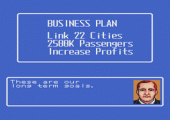
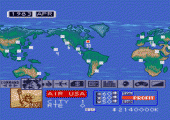
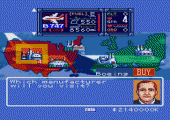
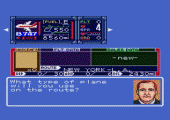
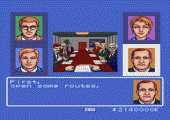
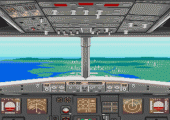
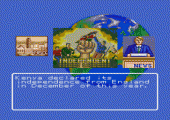
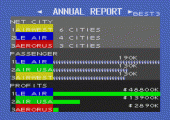

Recent Comments